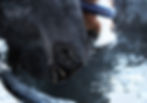Preventing Colic in Cold Weather
- Dr. Amanda Chang
- Jan 3, 2018
- 2 min read

Unfortunately, a decrease in the temperature can mean an increased risk for colic, specifically impaction colic. Impaction colic is when feed material forms a blockage in the large colon. There are several locations in the large colon where the diameter narrows, and this is where blockages tend to form.
How does cold weather play a role?
In colder temperatures, horses tend to drink less water. This leads to dehydration, which can lead to impaction colic: Dehydration slows gut movement and causes feed content to be very dry. These two factors combined increase the likelihood of impactions forming. However, just because the weather becomes cold does not mean your horse will form an impaction.
Here are some tips to help prevent colic in cold weather:
Ensure that your horse has continuous access to fresh, clean water. Make sure the water is not frozen either!
Consider placing a water bucket or tank heater as some horses prefer to drink warm water.
One research study done at the New Bolton Center at the University of Pennsylvania showed that if horses have access to ONLY warm water (during cold weather), then horses will drink a greater volume of water per day than if they have ONLY cold water available.
Make sure to inspect your water bucket/tank heaters for worn wires or other damage. Also, check the water for electrical sensations or shocks.
Wetting your horse's feed can be a good way to "trick" your horse into consuming water. Once again, if possible use warm water.
Providing electrolytes or a salt or mineral block may encourage water consumption. We recommend consulting with your veterinarian as not all horses should get certain electrolytes





























